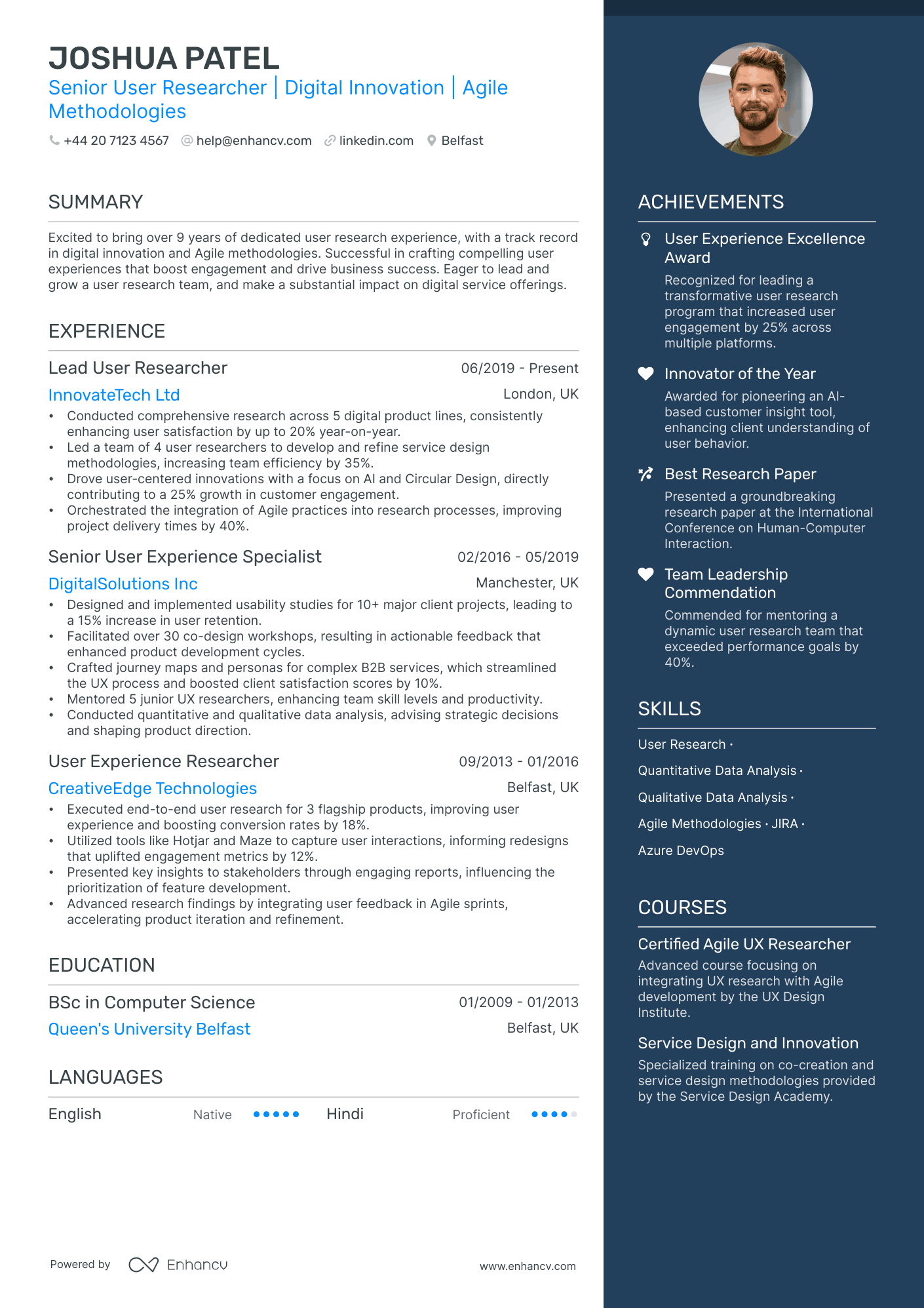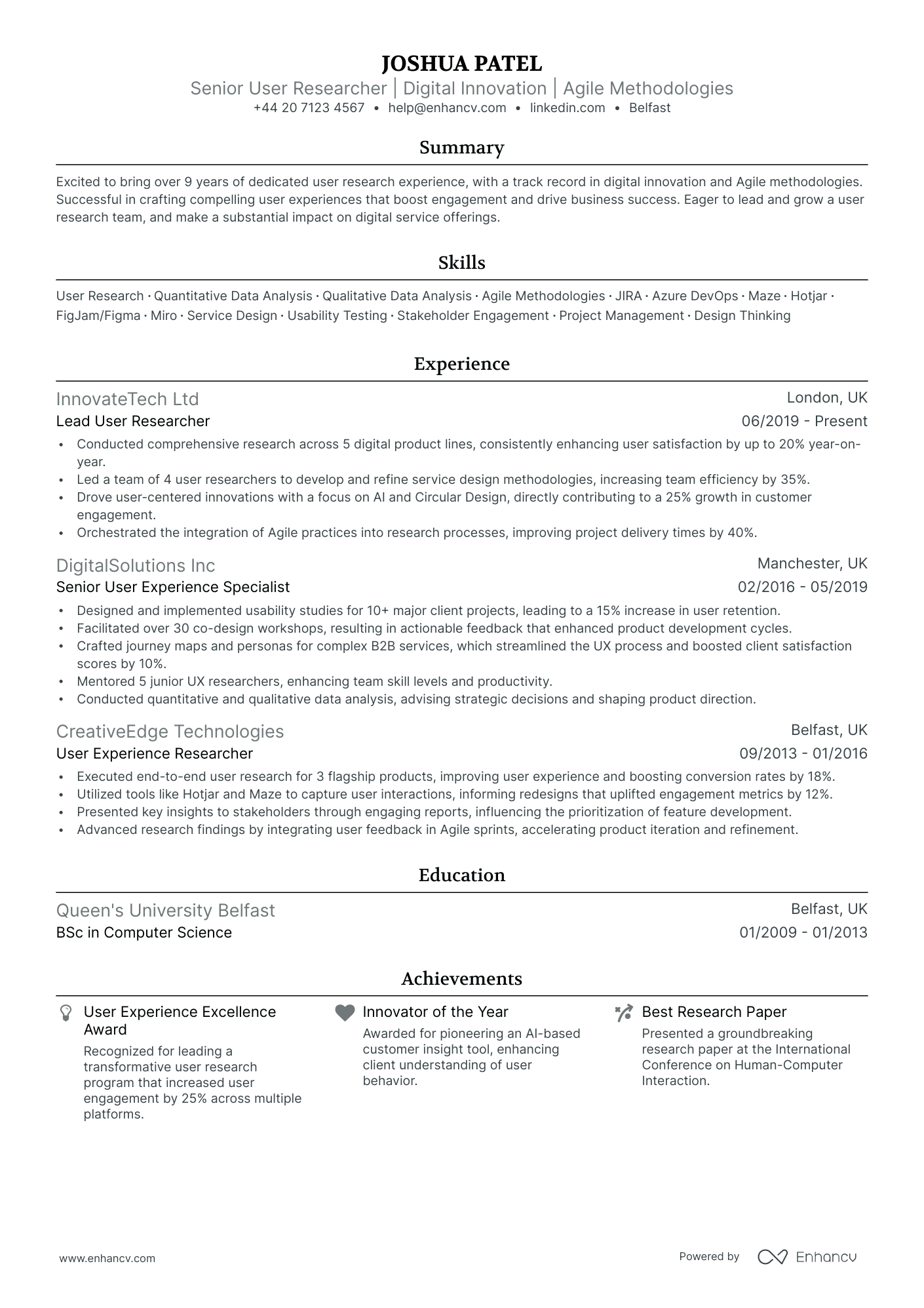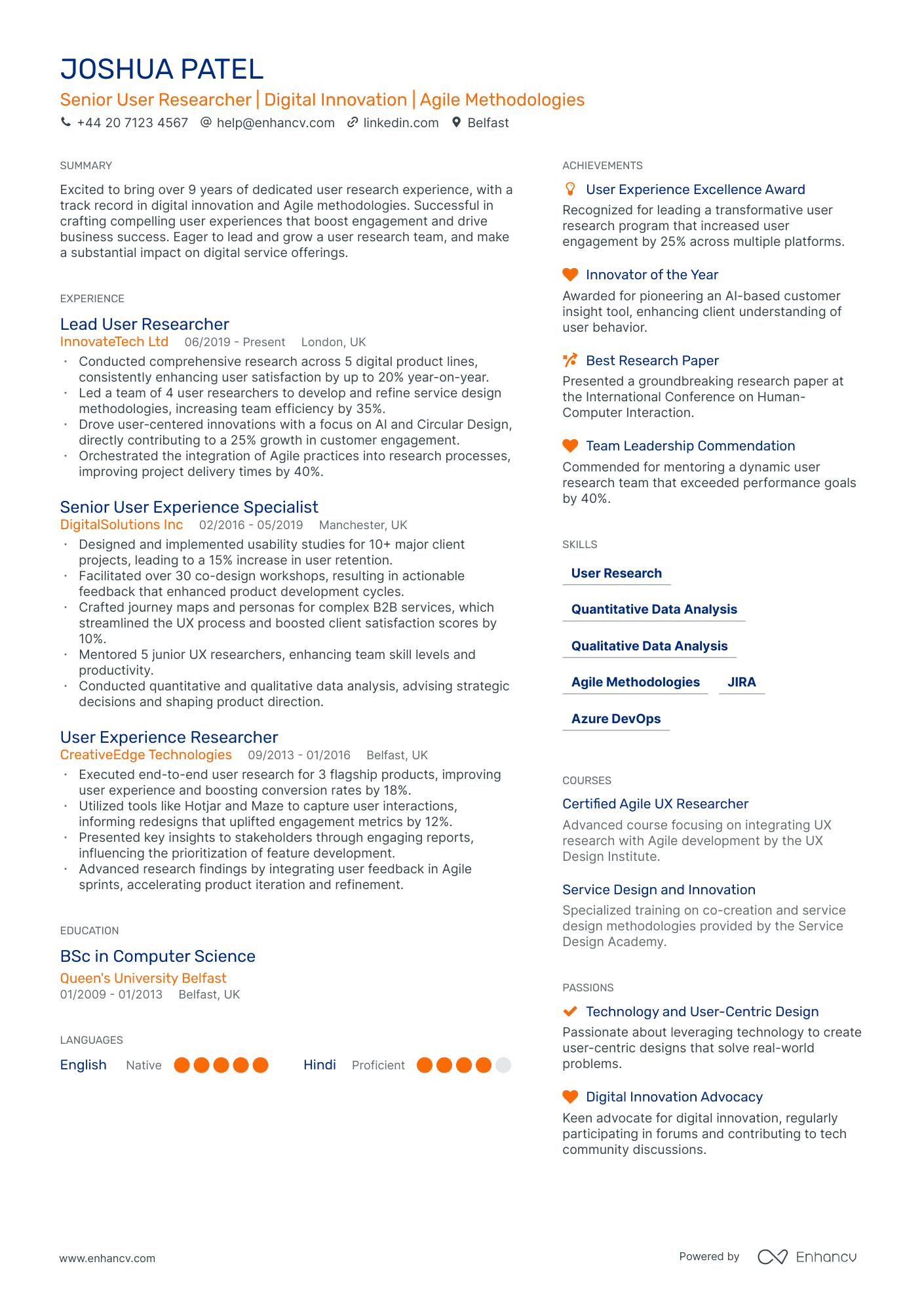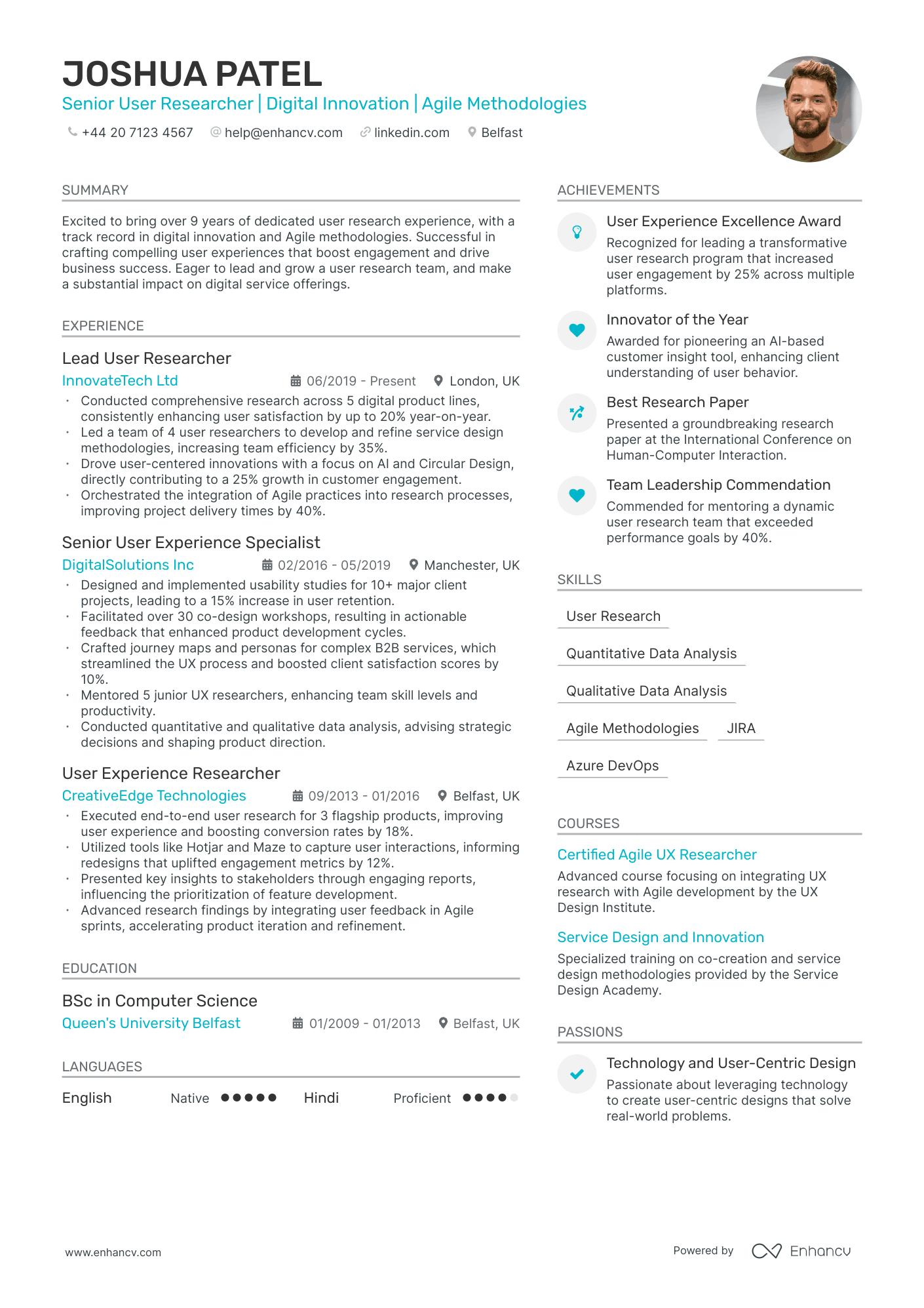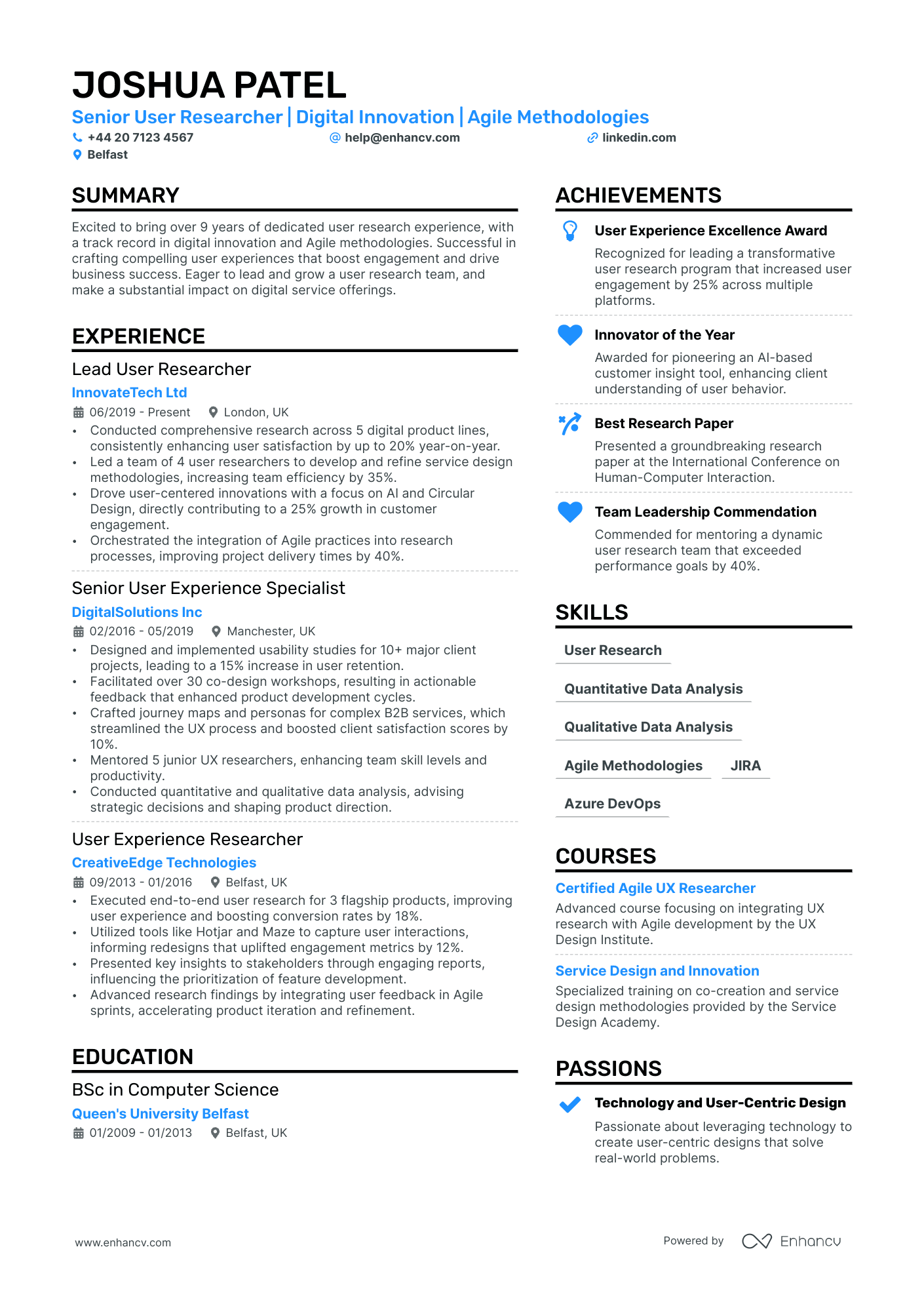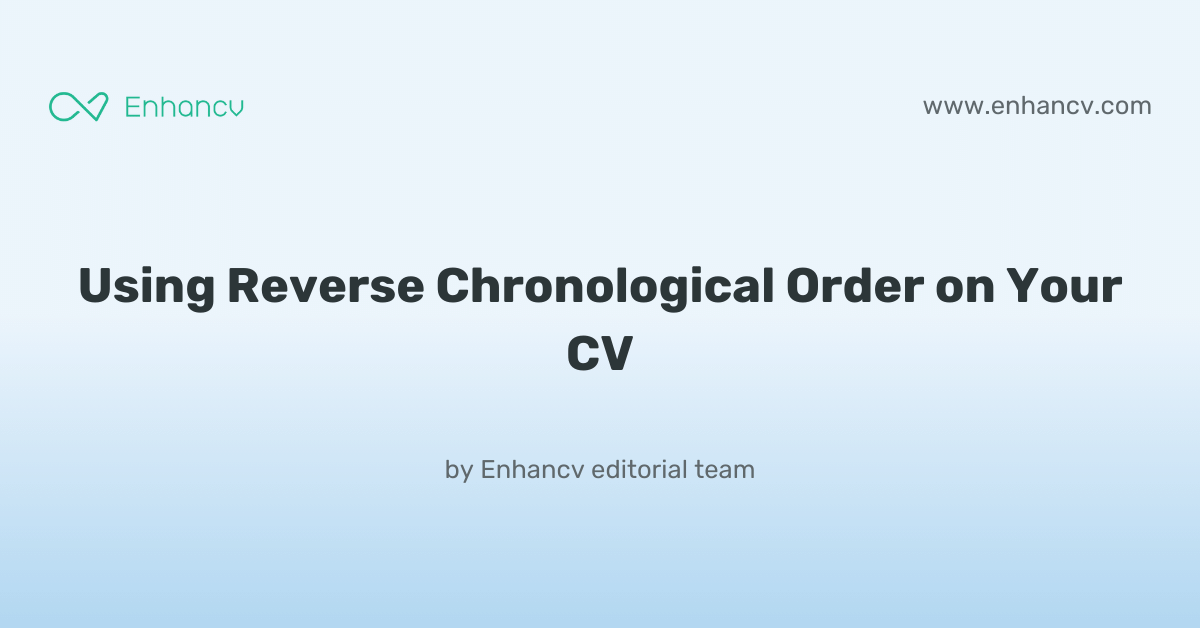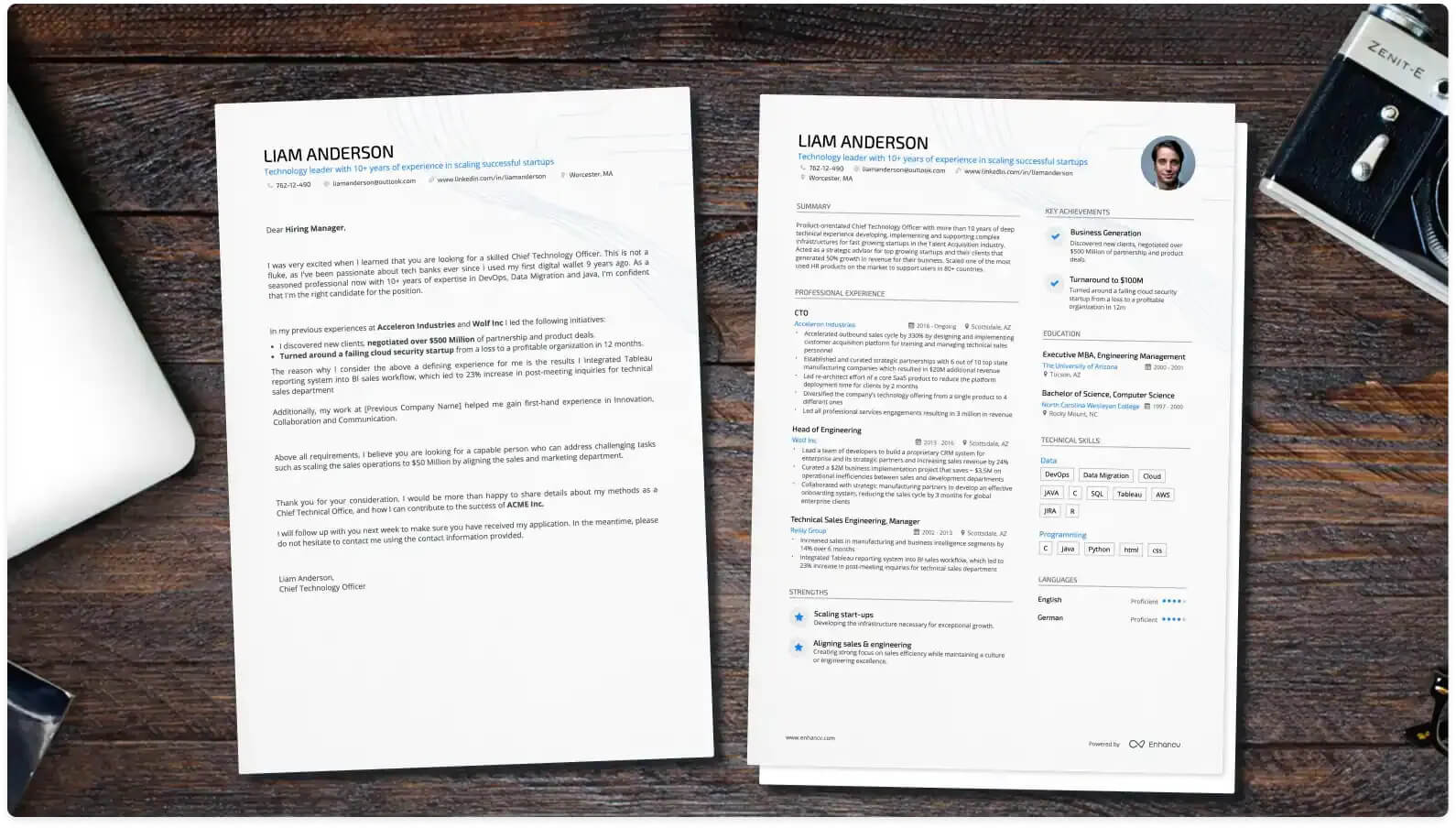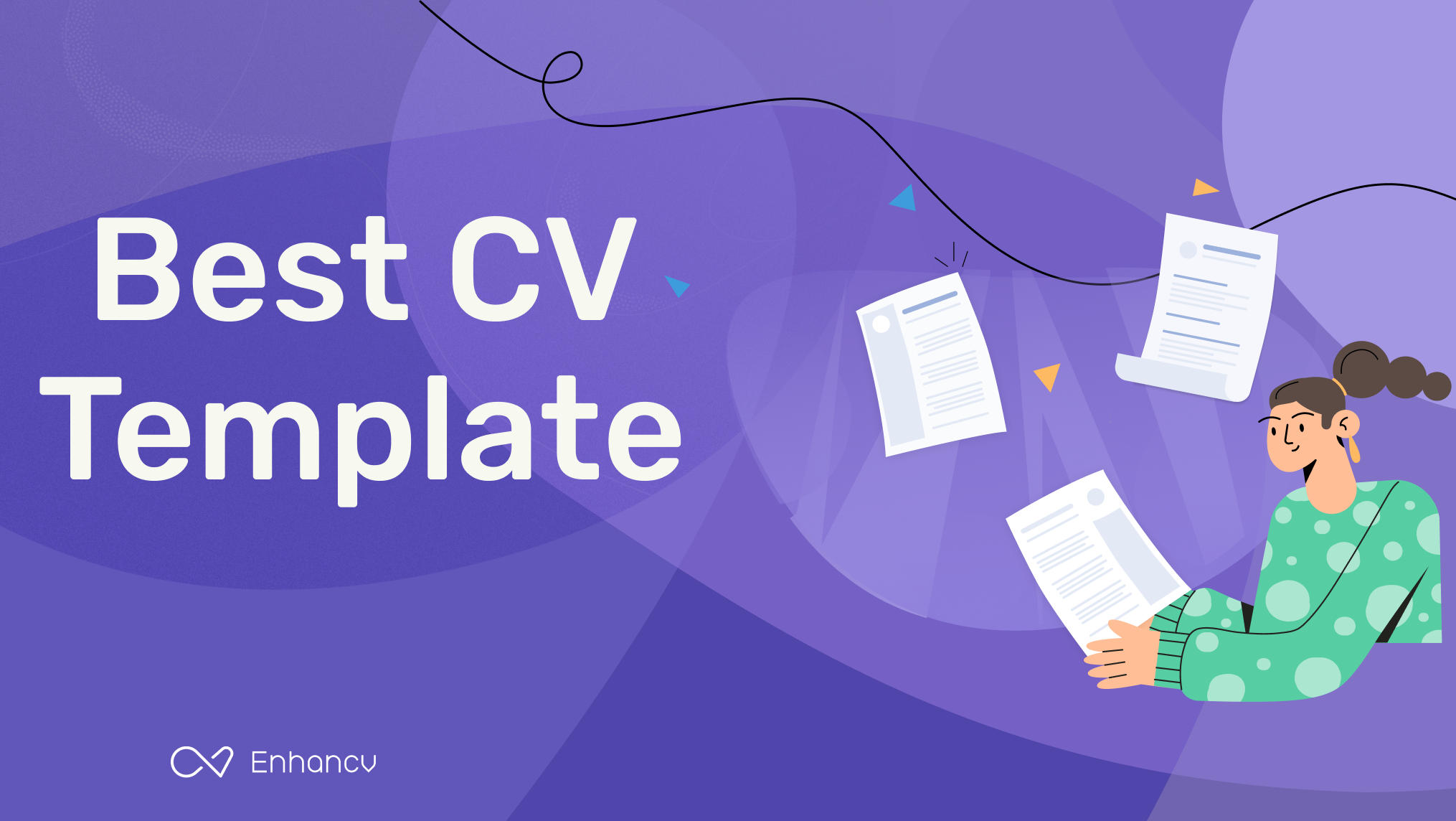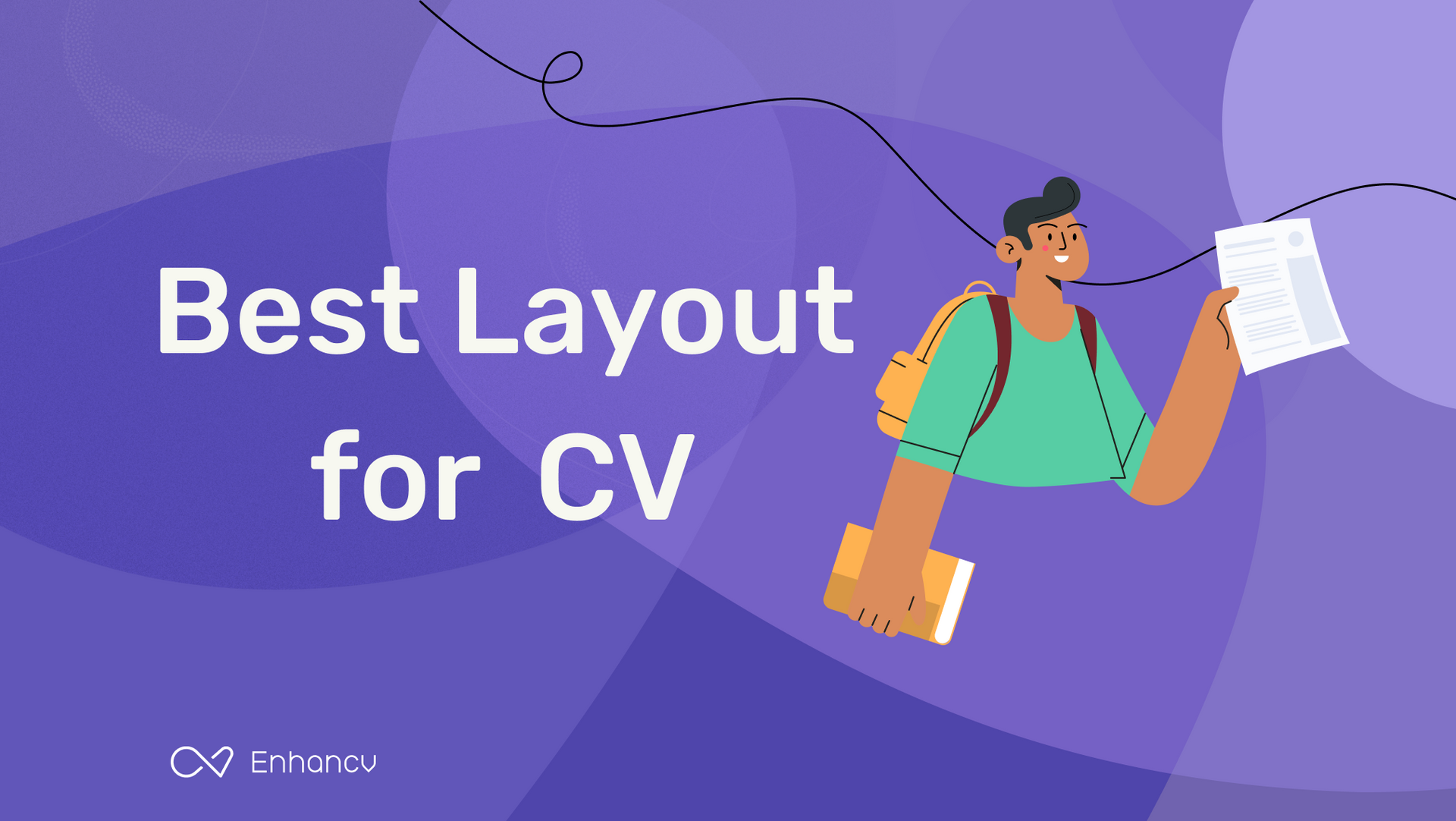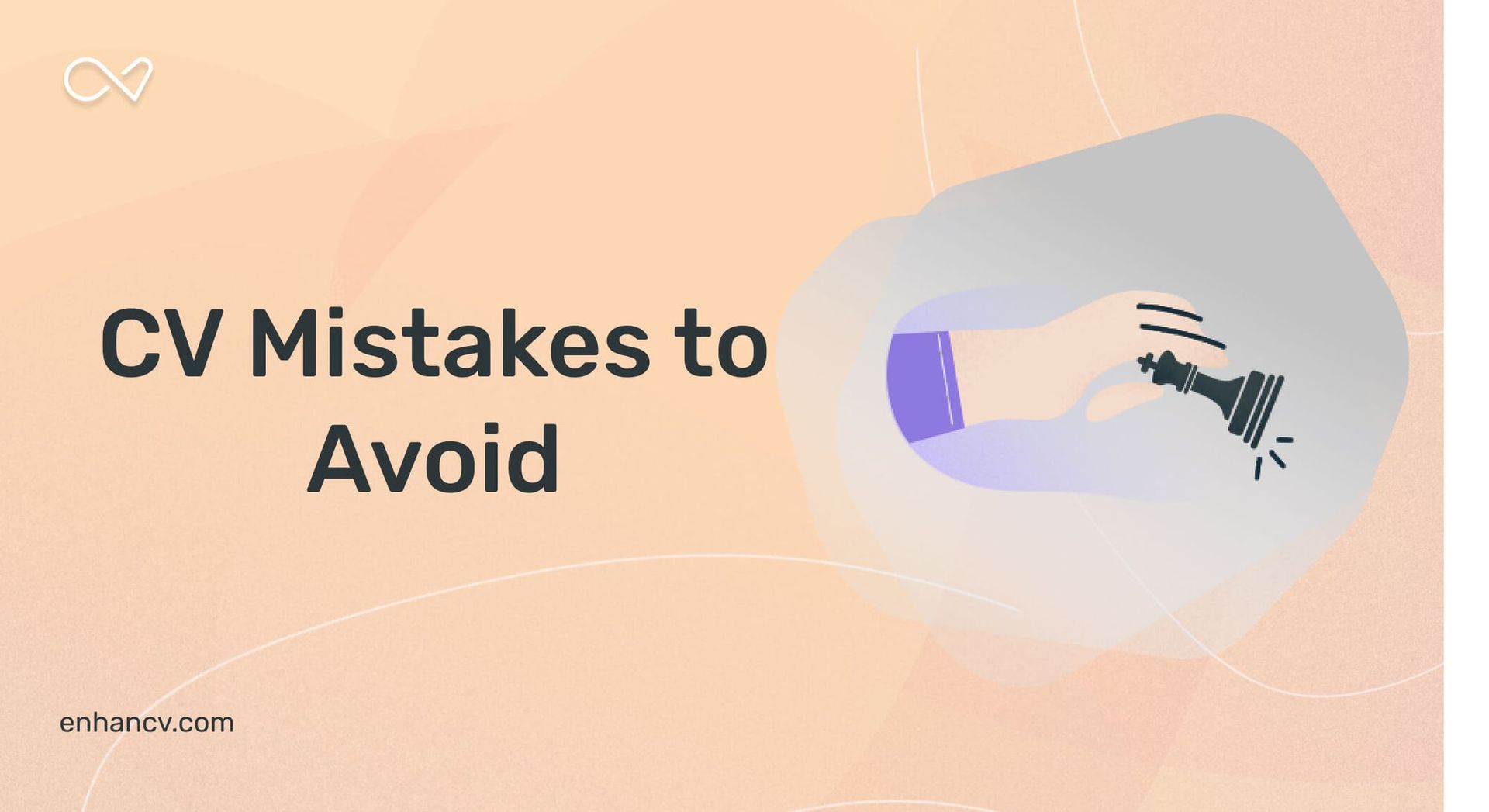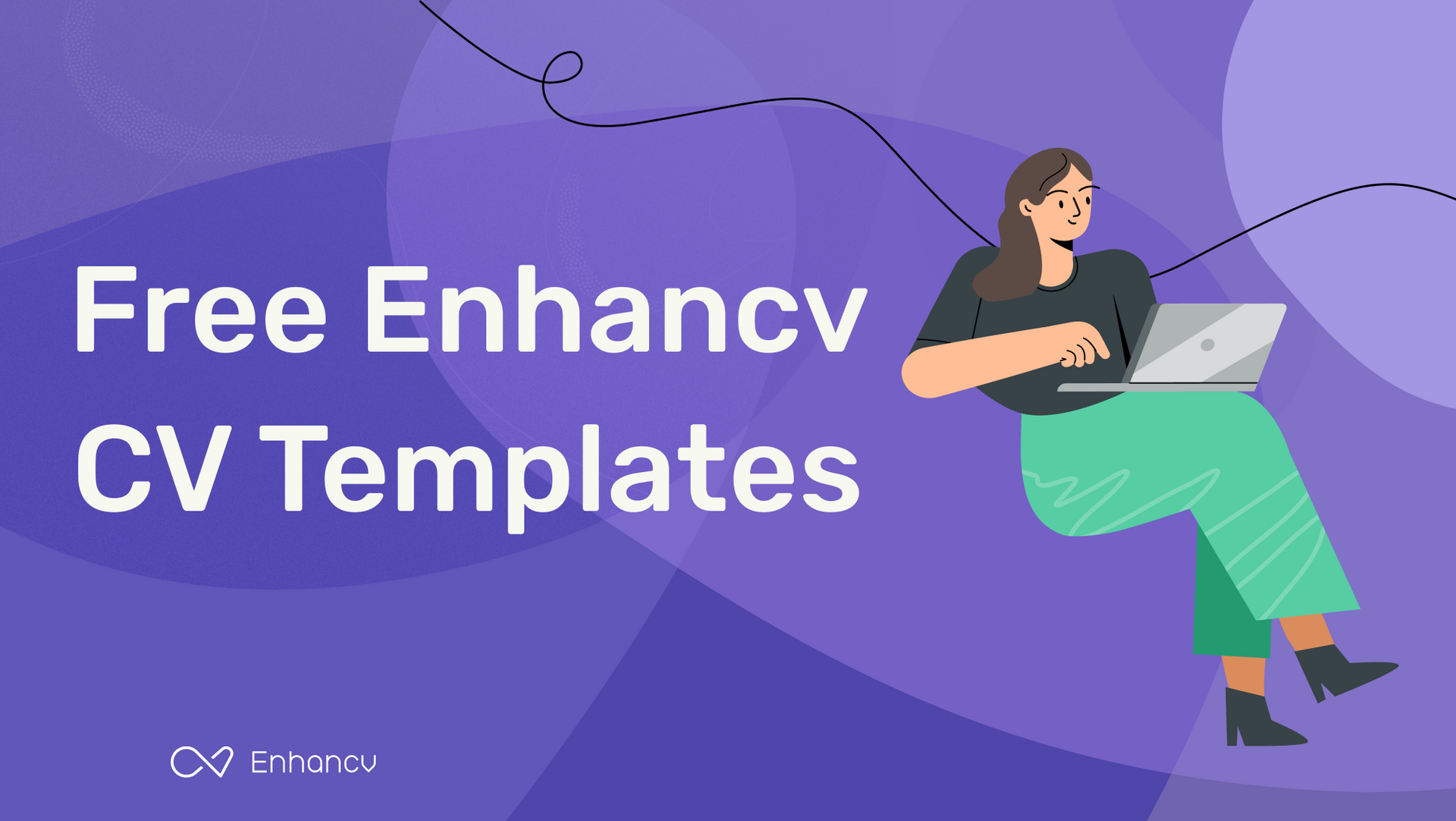One specific CV challenge you might face as a user researcher is effectively showcasing your ability to empathise with users and translate those insights into actionable product improvements. Our guide can help by providing strategies to concisely articulate these skills and demonstrate your impact with clear, compelling examples.
- Answer job requirements with your user researcher CV and experience;
- Curate your academic background and certificates, following industry-leading CV examples;
- Select from +10 niche skills to match the ideal candidate profile
- Write a more succinct experience section that consists of all the right details.
Do you need more specific insights into writing your user researcher CV? Our guides focus on unique insights for each individual role:
Formatting your user researcher CV to meet the role expectations
Staring at the blank page for hours on end, you still have no idea how you should start your professional user researcher CV. Should you include more colours, two columns, and which sections? What you should remember about your CV format is this - ensure it's minimalistic and doesn't go over the top with fancy fonts and many colours. Instead, focus on writing consistent content that actually answers the job requirements. But, how about the design itself :- Use the reverse chronological order to showcase your experience, starting with your most recent role;
- Include your contact details (email address, phone number, and location) - and potentially your professional photo - in the header;
- Must-have CV sections include summary or objective, experience, education, and skills: curate the ones that fit your profile;
- Your professional user researcher CV should be between one-to-two pages long: select the longer format if you have more experience.
A little bit more about your actual CV design, ensure you're using:
- plenty of serif or sans serif font (e.g. Montserrat, Exo 2, Volkhov) as they are Applicant Tracker System (ATS) compliant. Avoid the likes of Arial and Times New Roman because most candidates' CVs are in this typography.
When submitting your CV, are you still not sure what format it should be? Despite the myth that has been circling around, most modern ATS systems are perfectly capable of reading PDFs. This format is an excellent choice as it keeps all of your information intact.
PRO TIP
Use bold or italics sparingly to draw attention to key points, such as job titles, company names, or significant achievements. Overusing these formatting options can dilute their impact.
The top sections on a user researcher CV
- Relevant Work Experience showcasing past roles and achievements because they provide a track record of user research capabilities.
- Technical Skills and Tools indicating proficiency with specific research methods and software which is crucial for collecting and analysing user data.
- Education and Certifications to highlight formal training and qualifications in user research and related fields as they establish a foundation of knowledge.
- Key Projects and Case Studies illustrating successful research projects and their impact as evidence of the ability to deliver valuable insights.
- Professional Development and Training to show ongoing learning and up-to-date expertise in the rapidly evolving field of user research.
What recruiters value on your CV:
- Highlight your experience with various research methodologies, emphasising those most relevant to user research, such as user interviews, usability testing, and ethnography.
- Showcase your ability to analyse and synthesise data by providing examples of how you've translated research findings into actionable insights for design or product development.
- Demonstrate your empathetic approach towards users by detailing how you've advocated for user needs and influenced stakeholders to make user-centred decisions in previous roles.
- Include any experience with tools commonly used in user research, such as UserZoom, Lookback, or any other qualitative analysis software, to show your technical proficiency.
- Provide evidence of your communication skills by mentioning any reports, presentations, or workshops you've created to share research insights with cross-functional teams.
Recommended reads:
Tips and tricks on writing a job-winning user researcher CV header
The CV header is the space which most recruiters would be referring most often to, in the beginning and end of your application. That is as the CV header includes your contact details, but also a headline and a professional photo. When writing your CV header:
- Double-check your contact details for spelling errors or if you've missed any digits. Also, ensure you've provided your personal details, and not your current work email or telephone number;
- Include your location in the form of the city and country you live in. If you want to be more detailed, you can list your full address to show proximity to your potential work place;
- Don't include your CV photo, if you're applying for roles in the UK or US, as this may bias initial recruiters' assessments;
- Write a professional headline that either integrates the job title, some relevant industry keywords, or your most noteworthy achievement.
In the next part of our guide, we'll provide you with professional CVs that showcase some of the best practices when it comes to writing your headline.
Examples of good CV headlines for user researcher:
- Lead User Researcher | UX Strategy & Analysis Expert | Certified UX Professional | 10+ Years Experience
- Senior User Experience Investigator | Qualitative & Quantitative Methods | MSc HCI | 8 Years In-field
- User Research Specialist | Interaction Design Enthusiast | Agile Methodology | 5 Years Professional Practice
- Junior User Research Analyst | User-Centred Design Advocate | BSc Psychology | 2 Years Industry Insight
- Principal UX Research Consultant | Ethnography & Persona Development | PhD User Experience | 12 Years Leadership
- Mid-Level UX Researcher | Cognitive Psychology & Usability Testing | Advanced Analytics Pro | 4 Years Applied Research
What's the difference between a user researcher CV summary and objective
Why should it matter to you?
- Your user researcher CV summary is a showcasing your career ambitions and your unique value. Use the objective to answer why your potential employers should hire you based on goals and ambitions. The objective is the ideal choice for candidates who happen to have less professional experience, but still meet some of the job requirements.
Before you select which one will be more relevant to your experience, have a look at some industry-leading CV summaries and objectives.
CV summaries for a user researcher job:
- Seasoned user researcher with over 8 years of experience adept at deploying qualitative and quantitative methodologies to garner user insights. Excelled in creating robust usability testing protocols for a leading tech giant, resulting in a drastic increase in user satisfaction scores by 30% within a year.
- Diligent market analyst with a decade's expertise seeking to transition into user research. Proven track record in data interpretation and strategy formulation, with significant accomplishments in increasing market share by identifying customer trends and behaviours pertinent to product development.
- Ambitious sociologist aiming to apply 5 years of diverse fieldwork and analytical skills in a user research capacity. Renowned for pioneering a community engagement project that informed local government policy changes, demonstrating a strong ability to translate observations into actionable insights.
- Dedicated psychology graduate with honours, determined to leverage academic understanding of human behaviour and cognitive processes to begin a career in user research. Keen to utilise statistical analysis and experimental design skills to contribute to meaningful user experience enhancements.
- Looking to harness my strong passion for user-centred design and a freshly minted certification in UX research to effectively gather and analyse user data. Eager to develop actionable insights that can drive product improvements and enhance overall user satisfaction in an entry-level capacity.
- Creative professional with an extensive background in graphic design and multimedia, ready to pivot towards user research. Equipped with an intuitive grasp of design principles, I aspire to enrich user interfaces by integrating empirical user feedback into the iterative design process.
More detailed look into your work history: best advice on writing your user researcher CV experience section
The CV experience is a space not just to merely list your past roles and responsibilities. It is the CV real estate within which you could detail your greatest accomplishments and skills, while matching the job requirements. Here's what to have in your experience section:
- Prove you have what the job wants with your unique skill set and past successes;
- Start each bullet with a strong, action verb, and continue with the outcome of your responsibility;
- Use any awards, nominations, and recognitions you've received as solid proof of your skill set and expertise;
- align your experience with the role responsibilities and duties.
For more help on how to write your CV experience section, check out the next section of our guide:
Best practices for your CV's work experience section
- Quantify the impact of your research by describing the scope of projects, such as the number of participants, types of methodologies used, or the scale of the product improvements influenced by your insights.
- Detail your experience with different research methodologies, showcasing your flexibility and ability to choose the right tool for the question at hand, whether it be usability studies, interviews, surveys, or ethnographic field studies.
- Highlight collaborations with cross-functional teams like design, product management, and engineering, to emphasise your capability in driving user-centred design processes.
- Include examples of how your research led to tangible product or service improvements, providing context for how your insights influenced business or design decisions.
- Mention any specialised research tools or software you are proficient in, such as UserZoom, Lookback, or Optimal Workshop, that demonstrate your technical competency.
- Explain your hands-on experience with data analysis and synthesis, illustrating your ability to draw meaningful conclusions from complex data sets and present them to stakeholders.
- Reflect your communication skills by describing instances where you have successfully presented research findings to diverse audiences and influenced high-level strategy discussions.
- Emphasise your knowledge in creating and maintaining research repositories, understanding participant recruitment, and ensuring ethical standards and GDPR compliance during user research activities.
- State any experience in mentorship or leadership, such as leading a team of researchers or organising user research workshops, to showcase your potential for growth and team contribution.
- Led a comprehensive user study for a SaaS product, interviewing over 50 current users and analyzing usage patterns to inform product design improvements.
- Implemented Lean UX methodologies across design projects, reducing time-to-market by 30% and increasing cross-functional team efficiency through collaborative ideation sessions.
- Presented insights and actionable recommendations to the senior management, leading to a 20% enhancement in user satisfaction as measured by NPS scores.
- Designed and executed a multinational research project involving remote user testing, resulting in a unified global user experience strategy for the company's core products.
- Played a pivotal role in the development of a new mobile application, conducting heuristic evaluations and usability testing, ultimately achieving a 15% increase in user engagement.
- Facilitated over 25 workshops with stakeholders to translate user data into actionable product features, directly contributing to a 10% bump in market share.
- Orchestrated a user-centered redesign of an e-commerce website, utilizing card sorting and task analysis, which led to a 12% increase in conversion rates.
- Developed a set of personas and customer journey maps that guided the creation of targeted marketing campaigns and personalized user experiences.
- Conducted A/B testing on key user flows, providing insights that contributed to a streamlined checkout process and a reduction of cart abandonment by 18%.
- Spearheaded the user research initiative for a major redesign of an enterprise software suite, significantly enhancing the tool's usability and contributing to a 25% rise in customer retention.
- Analyzed user behavior through ethnographic research and log file analysis, informing product decisions and leading to a more intuitive user interface.
- Collaborated closely with product managers and developers to integrate user research findings into agile development cycles, ensuring user-centered principles were at the forefront of product evolution.
- Established a digital ethnography framework that provided insights into user habits and preferences, informing the development roadmap for an online banking platform.
- Crafted and monitored usability benchmarks which were crucial in prioritizing feature rollouts, reducing user error rates by over 20%.
- Synthesized research findings into compelling UX storyboards and visualizations that drove home the importance of user-centered design in executive-level meetings.
- Formulated and executed a strategic research plan for a start-up's mobile app, enhancing user retention by 35% within the first year of launch.
- Expertly combined quantitative data from analytics with qualitative user interviews to shape the information architecture of the client’s flagship product.
- Delivered comprehensive usability reports that influenced a major UI overhaul, drastically improving user task completion rates.
- Analyzed the competitive landscape and conducted comparative usability studies, leading to enhanced features that differentiated our products in a crowded marketplace.
- Streamlined the remote user testing process by incorporating new tools and techniques, boosting test participant numbers by 150% and diversifying user demographics.
- Provided evidence-based design recommendations that were critical in the decision-making process for the revision of core user interface elements.
- Mentored a team of user researchers in qualitative and quantitative research methods, achieving a 40% improvement in team output and research quality metrics.
- Overhauled the user feedback collection framework, which led to a more robust product feature set and a 22% decrease in user-reported issues post-launch.
- Key contributor in strategic planning meetings, ensuring that the voice of the user was represented in the long-term vision of the company’s suite of web services.
Lacking professional expertise: how to write your CV to highlight your best talents
Don't count on your lucky stars when you're applying for a role, where you happen to have less (or almost none) professional experience. Recruiters sometimes do hire inexperienced candidates if they're able to present their unique value from the get-go. So, instead of opting for the traditional, CV experience section:
- List any applicable expertise you happen to have - no matter if it's a part-time job, internship, or volunteer work. This would hint to recruiters that your profile is relevant;
- Focus your CV on your transferrable skills or talents you've obtained thanks to your whole life and work experience. In effect, you'll be spotlighting your value as a candidate;
- Separate more space for your applicable academic background and certificates to show you have the technical know-how;
- Ensure that within your objective, you've defined why you'll like the job and how you'll be the perfect match for it. Always ensure you've tailored your CV to individual applications.
Looking for more good examples for your first job? We'll show you how other candidates, with less professional experience, have created their job-winning CVs.
Recommended reads:
PRO TIP
Include examples of how you adapted to new tools, environments, or work cultures, showing your flexibility.
Key user researcher CV skills: what are hard skills and soft skills
Let's kick off with the basics. You know that you have to include key job requirements or skills across your CV. For starters, take individual skills from the job description and copy-paste them into your CV, when relevant. Doing so, you'll ensure you have the correct skill spelling and also pass the Applicant Tracker System (ATS) assessment. There are two types of skills you'll need to include on your CV:
- Hard skills - technical abilities that are best defined by your certificates, education, and experience. You could also use the dedicated skills section to list between ten and twelve technologies you're apt at using that match the job requirements.
- Soft skills - your personal traits and interpersonal communication skills that are a bit harder to quantify. Use various CV sections, e.g. summary, strengths, experience, to shine a spotlight on your workspace achievements, thanks to using particular soft skills.
Remember that your job-winning CV should balance both your hard and soft skills to prove your technical background, while spotlighting your personality.
Top skills for your user researcher CV:
User Experience (UX) Research
Qualitative Analysis
Quantitative Analysis
Usability Testing
User Interviews
A/B Testing
Data Analysis
Survey Design
Ethnographic Studies
Prototyping
Empathy
Communication
Critical Thinking
Problem-Solving
Active Listening
Collaboration
Adaptability
Attention to Detail
Time Management
Persuasiveness
PRO TIP
Use mini case studies or success stories in your CV to demonstrate how your skills have positively impacted previous roles or projects.
Listing your university education and certificates on your user researcher CV
The best proof of your technical capabilities would be your education and certifications sections. Your education should list all of your relevant university degrees, followed up by their start and completion dates. Make sure to also include the name of the university/-ies you graduated from. If you happen to have less professional experience (or you deem it would be impressive and relevant to your application), spotlight in the education section:
- that you were awarded a "First" degree;
- industry-specific coursework and projects;
- extracurricular clubs, societies, and activities.
When selecting your certificates, first ask yourself how applicable they'd be to the role. Ater your initial assessment, write the certificate and institution name. Don't miss out on including the completion date. In the below panel, we've curated relevant examples of industry-leading certificates.
PRO TIP
Order your skills based on the relevance to the role you're applying for, ensuring the most pertinent skills catch the employer's attention first.
Recommended reads:
Key takeaways
Impressing recruiters with your experience, skill set, and values starts with your professional user researcher CV. Write concisely and always aim to answer job requirements with what you've achieved; furthermore:
- Select a simple design that complements your experience and ensures your profile is presentable;
- Include an opening statement that either spotlights your key achievements (summary) or showcases your career ambitions (objective);
- Curate your experience bullets, so that each one commences with a strong, action verb and is followed up by your skill and accomplishment;
- List your hard and soft skills all across different sections of your CV to ensure your application meets the requirements;
- Dedicate space to your relevant higher education diplomas and your certificates to show recruiters you have the necessary industry background.
